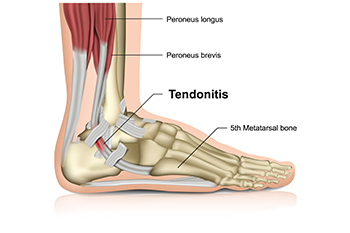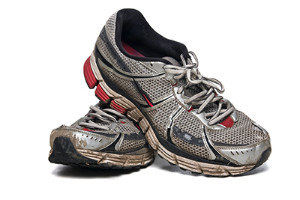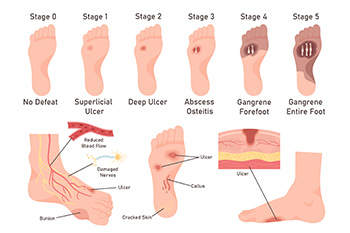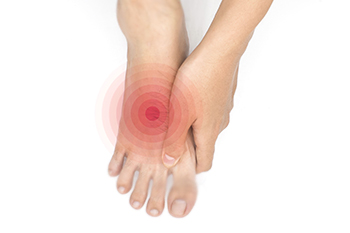Items filtered by date: March 2025
Achilles Tendon Injury in Dancers

Dancers place significant strain on the Achilles tendon due to repetitive movements, jumps, and intense footwork. This can lead to inflammation, microtears, or even more severe injuries if not properly managed. Overuse, inadequate warm-ups, and wearing improper footwear increase the risk of injury. Strengthening the calf muscles and improving flexibility through targeted exercises can help reduce strain on the tendon. Proper technique, gradual intensity progression, and sufficient rest between training sessions are essential for injury prevention. Supportive footwear and using appropriate dance surfaces can also minimize stress on the Achilles tendon. Paying attention to early signs of discomfort, such as stiffness or pain, allows for timely intervention. If you have sustained an Achilles tendon injury from dancing, it is suggested that you promptly contact a podiatrist who can offer effective treatment solutions and prevention tips.
Achilles tendon injuries need immediate attention to avoid future complications. If you have any concerns, contact one of our podiatrists of Foot and Ankle Reconstruction of Georgia. Our doctors can provide the care you need to keep you pain-free and on your feet.
What Is the Achilles Tendon?
The Achilles tendon is a tendon that connects the lower leg muscles and calf to the heel of the foot. It is the strongest tendon in the human body and is essential for making movement possible. Because this tendon is such an integral part of the body, any injuries to it can create immense difficulties and should immediately be presented to a doctor.
What Are the Symptoms of an Achilles Tendon Injury?
There are various types of injuries that can affect the Achilles tendon. The two most common injuries are Achilles tendinitis and ruptures of the tendon.
Achilles Tendinitis Symptoms
- Inflammation
- Dull to severe pain
- Increased blood flow to the tendon
- Thickening of the tendon
Rupture Symptoms
- Extreme pain and swelling in the foot
- Total immobility
Treatment and Prevention
Achilles tendon injuries are diagnosed by a thorough physical evaluation, which can include an MRI. Treatment involves rest, physical therapy, and in some cases, surgery. However, various preventative measures can be taken to avoid these injuries, such as:
- Thorough stretching of the tendon before and after exercise
- Strengthening exercises like calf raises, squats, leg curls, leg extensions, leg raises, lunges, and leg presses
If you have any questions please feel free to contact our offices located in Woodstock, Jasper, and Marietta, GA . We offer the newest diagnostic tools and technology to treat your foot and ankle needs.
Choosing the Right Shoes for Your Running Style

Selecting the right running shoes depends on the type of activity and terrain. Everyday running shoes should provide a balance of cushioning, durability, and support for regular training sessions. They offer comfort for long distances and daily wear. Carbon or race shoes are designed for speed, featuring lightweight materials and a carbon plate to enhance propulsion and efficiency. These shoes help improve performance during races and competitive events. Trail shoes are built for off-road running, offering aggressive tread patterns for grip and stability on uneven terrain. They provide extra protection against rocks and debris. Additionally, tempo and interval shoes are lightweight and responsive, ideal for faster-paced workouts and short, intense runs. Running enthusiasts can develop foot pain from wearing the wrong type of shoes. If this has happened to you, it is suggested that you consult a podiatrist who can treat various foot conditions, and further guide you on the appropriate shoes to wear for your desired running style.
You should always make sure your running shoes fit properly in order to avoid injury. For more information, contact one of our podiatrists from Foot and Ankle Reconstruction of Georgia. Our doctors can provide the care you need to keep you pain-free and on your feet.
Choosing the Right Running Shoe for Your Foot Type
Improper shoe sizing can cause a myriad of problems for your feet. Shoes that don’t fit you properly can lead to muscular imbalances in your body, which can result in foot, knee, and hip injuries.
Tips for Finding the Right Running Shoe
- Make sure you have a thumb’s width of wiggle room between the end of your longest toe and the front of the shoe.
- There should be little to no slipping at the heel
- Don’t assume your size in one shoe brand will be your size in another
- Do not lace up your shoes too tightly
- Walk around in the store with your new shoes before you buy them
If you have any questions please feel free to contact our our offices located in Woodstock, Jasper, and Marietta, GA . We offer the newest diagnostic and treatment technologies for all your foot and ankle needs.
Sedentary Lifestyle and Diabetic Foot Ulcers

Living an inactive life can seriously worsen diabetic complications, particularly in the feet. People with diabetes who are inactive may experience reduced blood flow, making the skin more fragile. When circulation is poor, small injuries can lead to foot ulcers. This risk increases with peripheral neuropathy, where nerves lose sensation and injuries go unnoticed. Without proper movement, the muscles weaken and support for the foot diminishes. The constant pressure and lack of exercise further harm blood circulation and tissue healing. Over time, these conditions can lead to severe ulcers that are slow to heal, putting individuals at risk of infections and other complications. Staying active helps improve circulation and muscle strength. Good foot care, including daily checks and proper hygiene, is imperative. For any signs of trouble, it is suggested that you see a podiatrist.
Diabetic foot care is important in preventing foot ailments such as ulcers. If you are suffering from diabetes or have any other concerns about your feet, contact one of our podiatrists from Foot and Ankle Reconstruction of Georgia. Our doctors can provide the care you need to keep you pain-free and on your feet.
Diabetic Foot Care
Diabetes affects millions of people every year. The condition can damage blood vessels in many parts of the body, especially the feet. Because of this, taking care of your feet is essential if you have diabetes, and having a podiatrist help monitor your foot health is highly recommended.
The Importance of Caring for Your Feet
- Routinely inspect your feet for bruises or sores.
- Wear socks that fit your feet comfortably.
- Wear comfortable shoes that provide adequate support.
Patients with diabetes should have their doctor monitor their blood levels, as blood sugar levels play such a huge role in diabetic care. Monitoring these levels on a regular basis is highly advised.
It is always best to inform your healthcare professional of any concerns you may have regarding your feet, especially for diabetic patients. Early treatment and routine foot examinations are keys to maintaining proper health, especially because severe complications can arise if proper treatment is not applied.
If you have any questions please feel free to contact our offices located in Woodstock, Jasper, and Marietta, GA . We offer the newest diagnostic and treatment technologies for all your foot and ankle needs.
Signs of Diabetic Peripheral Neuropathy

Diabetic peripheral neuropathy is a condition caused by prolonged high blood sugar levels that damage the nerves, especially those in the feet, toes, and ankles. Many people first notice numbness, tingling, or burning sensations, which can become more intense at night. Some patients may feel sudden, sharp pains or an electric shock-like sensation in their feet. As diabetic peripheral neuropathy progresses, loss of balance and coordination may also occur due to weakened ankle muscles and decreased sensation. This can lead to an unstable gait that increases the risk of falls. Changes in foot structure, such as hammertoes, may develop as nerve damage affects muscle function. One significant concern is the inability to feel cuts, blisters, or pressure points, which can result in unnoticed wounds that may become infected. A podiatrist can evaluate nerve function, provide foot care strategies, and recommend treatment to help prevent complications like foot ulcers and deformities. If your feet and toes feel numb, it is suggested that you schedule an appointment with a podiatrist to find out if peripheral neuropathy is causing the problem.
Neuropathy
Neuropathy can be a potentially serious condition, especially if it is left undiagnosed. If you have any concerns that you may be experiencing nerve loss in your feet, consult with one of our podiatrists from Foot and Ankle Reconstruction of Georgia. Our doctors will assess your condition and provide you with quality foot and ankle treatment for neuropathy.
What Is Neuropathy?
Neuropathy is a condition that leads to damage to the nerves in the body. Peripheral neuropathy, or neuropathy that affects your peripheral nervous system, usually occurs in the feet. Neuropathy can be triggered by a number of different causes. Such causes include diabetes, infections, cancers, disorders, and toxic substances.
Symptoms of Neuropathy Include:
- Numbness
- Sensation loss
- Prickling and tingling sensations
- Throbbing, freezing, burning pains
- Muscle weakness
Those with diabetes are at serious risk due to being unable to feel an ulcer on their feet. Diabetics usually also suffer from poor blood circulation. This can lead to the wound not healing, infections occurring, and the limb may have to be amputated.
Treatment
To treat neuropathy in the foot, podiatrists will first diagnose the cause of the neuropathy. Figuring out the underlying cause of the neuropathy will allow the podiatrist to prescribe the best treatment, whether it be caused by diabetes, toxic substance exposure, infection, etc. If the nerve has not died, then it’s possible that sensation may be able to return to the foot.
Pain medication may be issued for pain. Electrical nerve stimulation can be used to stimulate nerves. If the neuropathy is caused from pressure on the nerves, then surgery may be necessary.
If you have any questions, please feel free to contact our offices located in Woodstock, Jasper, and Marietta, GA . We offer the newest diagnostic and treatment technologies for all your foot care needs.
